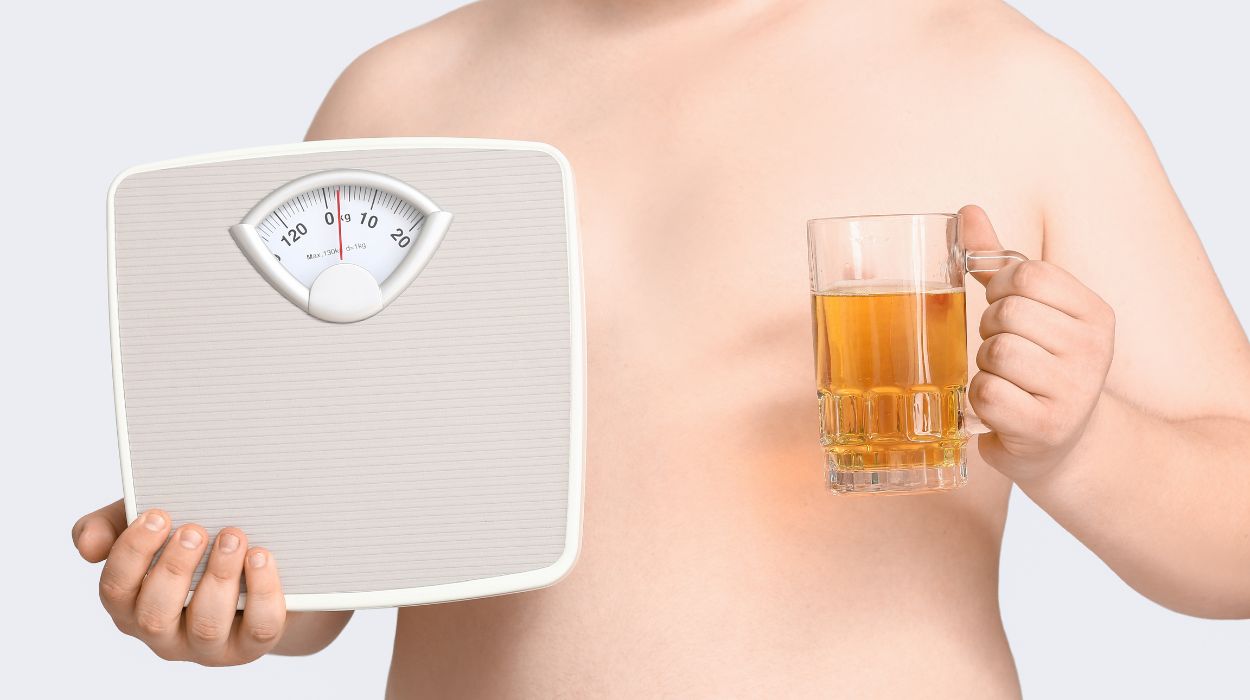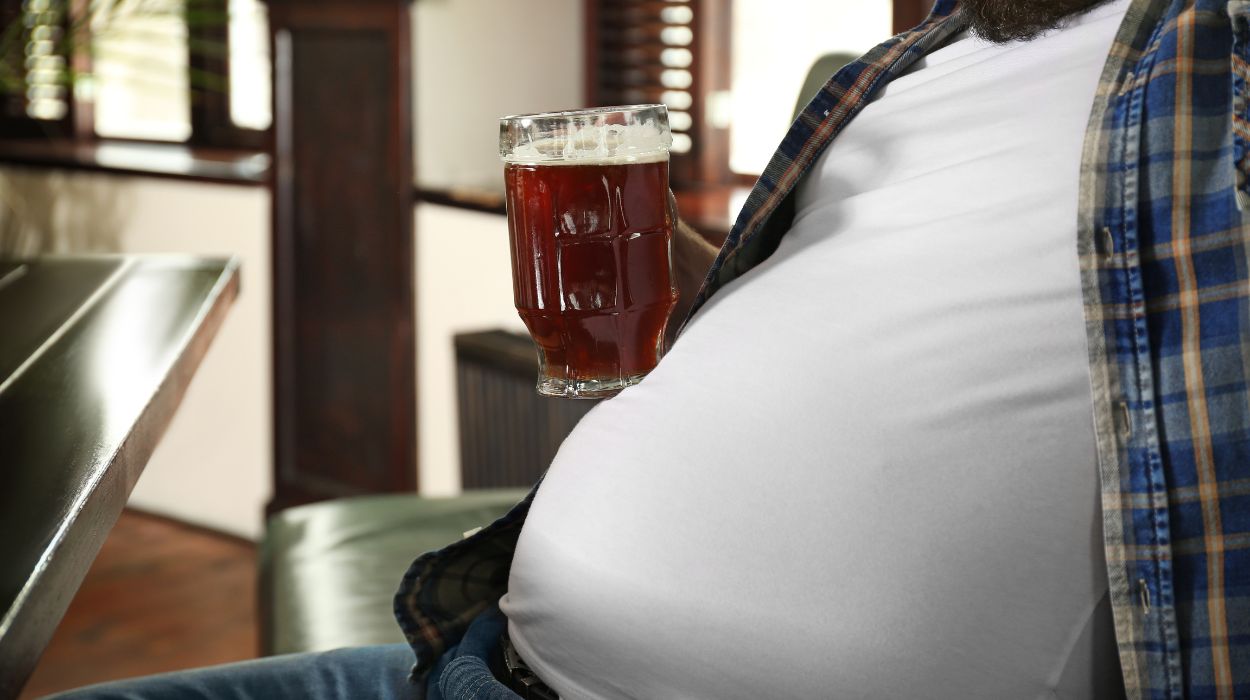 Expert's opinion
Expert's opinion
Expert's opinion
The article is a subjective view on this topic written by writers specializing in medical writing.
It may reflect on a personal journey surrounding struggles with an illness or medical condition, involve product comparisons, diet considerations, or other health-related opinions.
Although the view is entirely that of the writer, it is based on academic experiences and scientific research they have conducted; it is fact-checked by a team of degreed medical experts, and validated by sources attached to the article.
The numbers in parenthesis (1,2,3) will take you to clickable links to related scientific papers.
How To Get Rid Of A Beer Belly: Easy Ways To Work Off It 2024

A prominent beer belly is commonplace among people who enjoy drinking beer and is predominantly visible in men. However, beer may not be the only culprit causing beer bellies to form. Some people abstain from drinking beer but still develop a beer gut. So, what are the root causes of a rotund, hard abdominal section? And why is it so difficult to get rid of a beer belly?
A combination of exercise, using oil, and a healthy diet can help. Let’s explore how and why body fat tends to be stored in and around the abdomen and healthy ways to remedy it.
Healthy Ways To Lose Beer Belly
Don’t settle with the idea that you have to live with your beer gut or struggle to get rid of it. There are healthy working solutions that can reduce stubborn belly fat and increase your sense of well-being. Consider the following solutions to improve your health, and happiness and reduce a troublesome beer belly.
- CBD Oils
- Exercising
- Change Diet
- Change Lifestyle
- Take Supplements
How To Get Rid Of A Beer Belly Quick

Explore CBD Oil
Add CBD oil to your daily routine when you enjoy drinking alcohol or other beverages. CBD has been studied for its weight loss and fat-burning properties in rodents,[1] as it may help the body break down fat more effectively. In addition to helping shrink fat cells[2] and boost metabolism, CBD oil contains multiple positive benefits for the body.
Exercises
Challenge yourself to get up and get moving more often to tackle a beer belly. Choose to regularly commit to planks and other exercises that target the abdominal area. Spend time engaged in aerobic exercise to get your heart pumping, burn calories, and boost your metabolism to blast away stubborn fat deposits.
Make Dietary Changes
Eating more healthy foods high in fiber and probiotics can improve gut health, reduce symptoms of leaky gut and an unbalanced microbiome, and help reduce a beer gut. Make the switch when drinking and enjoy foods and snacks that are satisfying without excess grease, sugar, or fat.
Make Lifestyle Changes
Reduce a beer belly by not binge drinking, enjoying alcoholic beverages in moderation, and making positive lifestyle changes. Take the time to get regular exercise, drink enough water, and support a healthy gut microbiome to regulate stress levels, sleep, food cravings, and manage your weight.
Take Supplements
Consider taking supplements that include vitamins B12, B6, zinc, and other helpful elements to boost your health and wellness. Certain foods and supplements containing cayenne pepper, green tea extract, fiber, and probiotics can help reduce abdominal fat and boost metabolism and weight loss.
What Is A Beer Belly?
The term “beer belly” is used to describe a protruding abdominal section that may be hard to touch. However, both men and women can develop a beer belly without even touching one drop of alcohol. Thankfully, there are plenty of helpful solutions to get rid of a beer gut, from using oil to exercising more frequently and eating fat-burning foods.
It may take a combination of multiple solutions to resolve a stubborn beer belly and reduce one’s waistline. Getting rid of a beer belly is not solely about vanity and creating a more desirable physical appearance. When one has excess abdominal fat that is not being treated, it can trigger serious health issues in women and men.
What Causes Beer Gut?

If you want to get rid of a beer belly successfully, you first need to understand the root causes of its development. The following can contribute to a prominently protruding belly in men and women alike.
- Excessive Alcohol Consumption
- Hormonal Changes
- Stress
- Sleep Problems
- Poor Dietary Choices
- A Sedentary Lifestyle Devoid Of Exercise
- Genetics
Let’s explore how each of these points can contribute to a beer belly and the related health risks each poses.
Alcohol
If you love drinking beer made from hops, your body may be absorbing more phytoestrogens than you would like. Phytoestrogens are found in hops, and foods like soy and tempeh can increase estrogen levels. A downside of phytoestrogens[3] is the potential development of hormonal imbalances, leading to increased visceral fat in male pectoral tissue and a developing beer belly. Additionally, alcohol’s high-caloric nature inherently leads to a beer gut. An excessive calorie intake from beer consumption can contribute to gain weight and an expanding waist circumference.
Hormones
Certain hormones help regulate various functions in the body, from metabolism to food cravings. When hormones fluctuate in production due to factors like stress or advanced age, it can lead to body weight gain around the abdomen and an extended waistline.
Stress
It can be difficult living with stress that is ever-present in modern life. However, women are especially vulnerable to holding onto excess abdominal fat because of stress. High levels of stress[4] trigger more cortisol to course through the body, creating a domino effect that leads to beer bellies,[5] overeating, poor sleep, and exacerbating ailments.
Sleep Issues
A beer gut could be caused when one is suffering from problems with poor sleep quality. Drinking in itself could trigger insomnia, and a gut with an unbalanced microbiome may also trigger sleep issues. There are documented connections between the use of alcohol and sleep disturbances, like leaky gut and a disrupted circadian rhythm that can result from alcohol intake.
Diet
Often, when enjoying alcoholic beverages like beer, it accompanies convenience foods that are less than ideal. Eating excessive fried foods, fast foods, sugar, processed foods, and indulging in too many calories can contribute to a beer gut. Make the switch to eating less unhealthy foods, control portion sizes, and eat healthier foods to curb cravings for fat and sugar. Don’t forget adding more fruits to your diet also adds fiber and keeps you full. Too many beers and processed food will only add excess calories.
Lack Of Exercise
Suppose you are spending too much time being sedentary or inactive, whether due to occupation or lifestyle changes, it can become a problem. A beer belly can result if one takes in too many calories and doesn’t burn them off. Making an effort to exercise helps promote healthy metabolism and cardiovascular health and reduces the tendency to overeat and stress.
Genetics
For a certain amount of the population, genetic predisposition to developing a beer belly may be to blame. Scientists have looked into gene variations that contribute to a flabby stomach and obesity.[6] Anyone with a genetic predisposition for holding onto abdominal fat may more easily become overweight and display a beer gut.
Why Is It Important To Lose Belly Fat?
Losing a beer gut isn’t for appearances alone, as excessive abdominal fat can trigger various unwanted health issues. Binge drinking can be horrible for your liver, and consuming more calories than needed creates excess belly fat. Holding onto a protruding belly can contribute to heart disease, obesity, diabetes, sleep problems, stress, and low self-esteem over body image and overall health.
How Long Does It Take To Get Rid Of Beer Belly?
It’s one thing to apply an actionable plan to get rid of a beer belly, but how long until you see noticeable results? Ultimately, the length of time it takes to get rid of a beer belly depends on your initial starting weight and the changes you make. Set a reasonable goal for yourself to lose weight and adjust your caloric intake. In as little as two to three months, you may notice a shrinking waistline, improved health, better sleep, and increased energy levels.
Precautions
It is wise to reduce a beer belly because of underlying and related health issues that can arise. A beer belly can contribute to excessive stress on the body’s joints due to obesity, increased high blood pressure, low HDL cholesterol, and high levels of triglycerides.
In addition, a beer belly can increase the risks of developing heart disease, sleep apnea, incurring a stroke, or developing type 2 diabetes. Overall, living with an extended waistline and prominent beer gut can make living well challenging. Consider consulting with your physician regarding positive changes to your lifestyle, and diet, and taking supplements or medications to assist with reducing a beer belly.
+ 6 sources
Health Canal avoids using tertiary references. We have strict sourcing guidelines and rely on peer-reviewed studies, academic researches from medical associations and institutions. To ensure the accuracy of articles in Health Canal, you can read more about the editorial process here
- Verty, A.N.A., Megan Joan Evetts, Crouch, G.J., McGregor, I.S., Stefanidis, A. and Oldfield, B.J. (2011). The Cannabinoid Receptor Agonist THC Attenuates Weight Loss in a Rodent Model of Activity-Based Anorexia. Neuropsychopharmacology, [online] 36(7), pp.1349–1358. doi:https://doi.org/10.1038/npp.2011.19.
- Hilal Ahmad Parray and Jong Won Yun (2016). Cannabidiol promotes browning in 3T3-L1 adipocytes. Molecular and Cellular Biochemistry, [online] 416(1-2), pp.131–139. doi:https://doi.org/10.1007/s11010-016-2702-5.
- Kuryłowicz, A., Cąkała-Jakimowicz, M. and Puzianowska-Kuźnicka, M. (2020). Targeting Abdominal Obesity and Its Complications with Dietary Phytoestrogens. Nutrients, [online] 12(2), pp.582–582. doi:https://doi.org/10.3390/nu12020582.
- Madison, A.A. (2019). Stress, depression, diet, and the gut microbiota: human–bacteria interactions at the core of psychoneuroimmunology and nutrition. Current Opinion in Behavioral Sciences, [online] 28, pp.105–110. doi:https://doi.org/10.1016/j.cobeha.2019.01.011.
- Aschbacher, K., Kornfeld, S., Picard, M., Puterman, E., Havel, P.J., Stanhope, K.L., Lustig, R.H. and Epel, E.S. (2014). Chronic stress increases vulnerability to diet-related abdominal fat, oxidative stress, and metabolic risk. Psychoneuroendocrinology, [online] 46, pp.14–22. doi:https://doi.org/10.1016/j.psyneuen.2014.04.003.
- Aberle, J., Flitsch, J., Nicola Alessia Beck, Mann, O., Busch, P., Philipp Peitsmeier and Beil, F.U. (2008). Genetic variation may influence obesity only under conditions of diet: Analysis of three candidate genes. Molecular Genetics and Metabolism, [online] 95(3), pp.188–191. doi:https://doi.org/10.1016/j.ymgme.2008.07.008.



